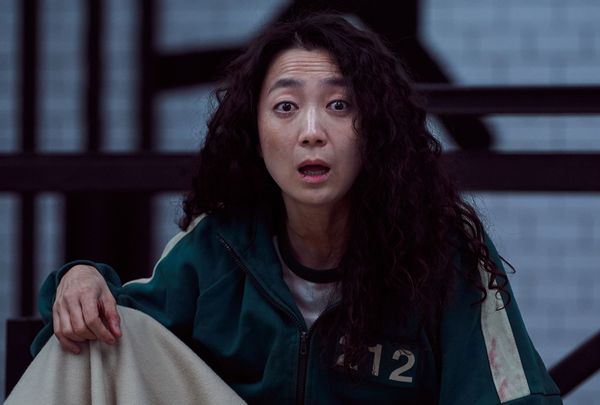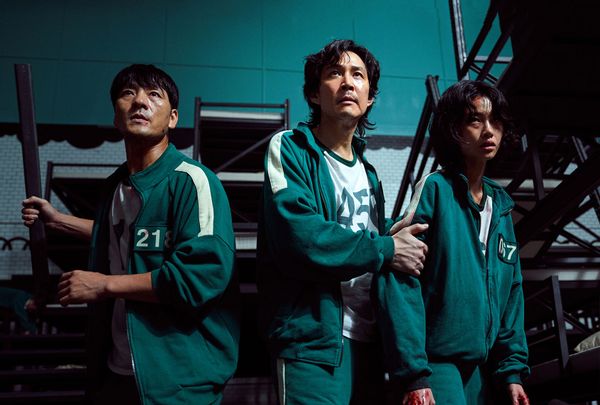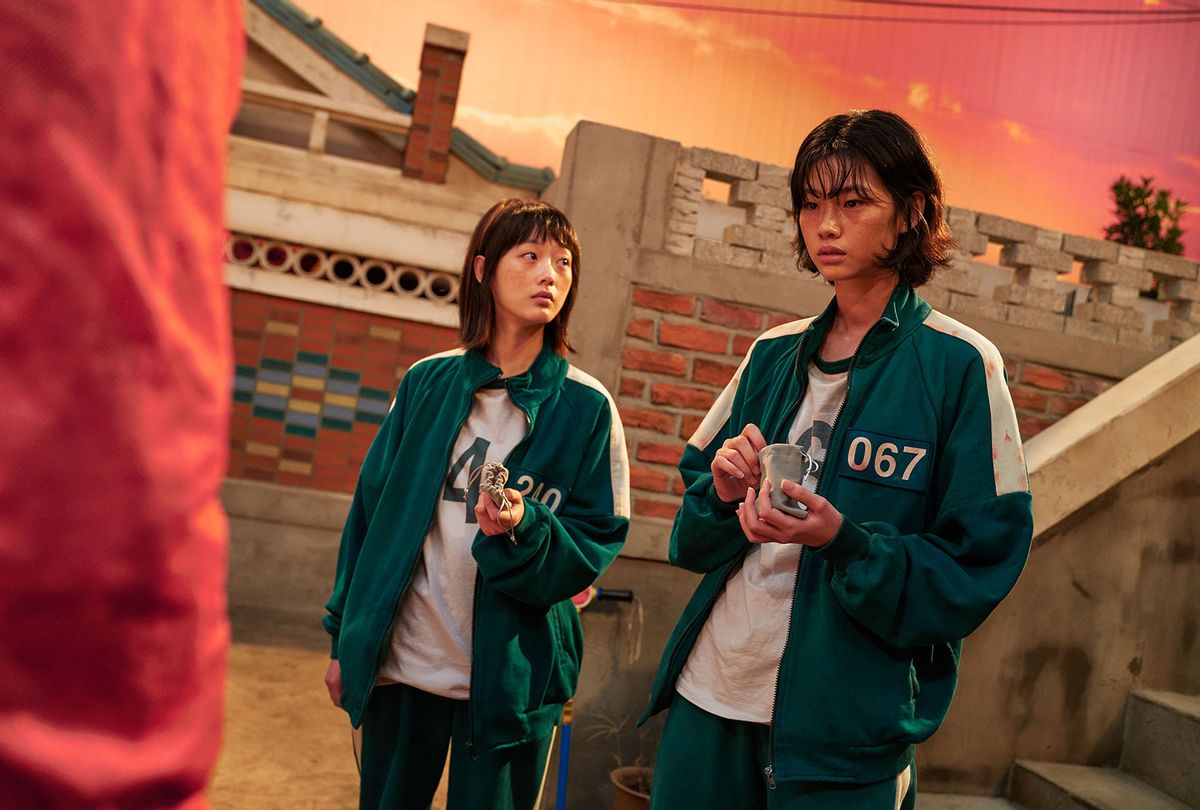As Netflix's runaway fall hit, "Squid Game" hasn't just entertained, but has prompted audiences to reflect on its themes of the corrosive violence and dehumanization of predatory capitalism. And while most of its characters end up losing under the show's cutthroat conditions, the series particularly fails in the narratives assigned to its few featured women.
Written and directed by Hwang Dong-hyuk, the show follows hundreds of impoverished people competing in what they think will be a series of children's games for a chance at approximately $40 million U.S. dollars. Instead, they soon discover they're fighting for their lives, while the ultra-rich watch and make bets.
As the players – designated by numbers on their uniform green tracksuits – are eliminated one by one, and sometimes en masse, it's not terribly surprising that the main female characters all meet grisly deaths, albeit deaths that are somewhat coded as heroic. But upon further examination, it's clear that their stories are just bulked up enough to provide leeway for the series' male characters.
The sacrifice of Ji-yeong, No. 240
"Squid Game" has notably been praised by some for its surprising feminism in its short but touching scenes between two young women. Sae-byeok (Jung Ho-yeon), aka No. 67, is introduced from the outset as a rather surly pickpocket who is reluctant to trust others. We don't meet Ji-yeong (Lee Yoo-mi), No. 240, until halfway through the series during the tug o' war episode when it appears it seems there's little else to her beyond hating on a religious teammate.
When Sae-byeok and Ji-yeong decide to pair up for the next challenge, playing a game of marbles, it's revealed to them afterward that they're not teammates this time but opponents, and that the loser must die. While the rest of the pairs glumly decide on which game of marbles will decide their fates within the next half hour, the two young women instead spend their time together talking and getting to know each other.
Sae-byeok reveals her desperate journey from North Korea with her younger brother, and how the game's prize money will allow her to retrieve him from an orphanage and take care of him. Ji-yeong, on the other hand, has just gotten out of prison after killing her father, whom the show hints was abusive toward Ji-yeong and her mother. This is essentially 240's only significant amount of screentime throughout "Squid Game," and her story, presumably as a survivor who has been criminally and economically punished for self-defense toward her abuser, is compelling and gutting.
And as the clock ticks down to the deadline when a winner must be determined, Ji-yeong willingly throws the game. She chooses to be the one to die.
Want a daily wrap-up of all the news and commentary Salon has to offer? Subscribe to our morning newsletter, Crash Course.
There's no doubt that nearly every contestant on "Squid Game" has a powerful personal story and reasons for playing the games. But 240's story stands out among those we know of men like No. 456 Gi-hun (Lee Jung-jae) and his gambling problems, or Jang Deok-su (Heo Sung-tae), No. 101, and his debts as a gangster. Ji-yeong is a survivor who ultimately sacrifices her life to help another young woman reunite with and take care of her family.
Losing Ji-yeong shortly after hearing her story and witnessing her kindness is tragic, but it's also frustrating because like so many other narratives about women told by men, it uses abuse as a mere storytelling device. It's a shorthand approach to building a deeper understanding of motivation and character, instead of offering her more focus, unpacking and screentime to build a narrative properly. Ji-yeong cheated in her marbles game to sacrifice herself, and we as viewers feel cheated as well.
The vengeance of Mi-nyeo, No. 212
 Kim Joo-ryung as Han Mi-nyeo in "Squid Game" (Netflix/YOUNGKYU PARK)
Kim Joo-ryung as Han Mi-nyeo in "Squid Game" (Netflix/YOUNGKYU PARK)
Following 240's poignant death, the two remaining women are of course doomed also. The brash and mouthy self-proclaimed single mom Han Mi-nyeo (Kim Joo-ryoung), No. 212, had made her presence felt – and heard – from the start. Although, there's some question of whether her sob story about not being able to name her newborn was just a con for sympathy, very little effort is spent in telling her backstory to determine why she needs the prize money so badly. Regardless, she's portrayed to be a rather ruthless player but also wily; she's one of only two characters shown to be smart enough to figure out how to smuggle in contraband into the competition.
The arrogant Deok-su finds out she's a force to be reckoned with in the worst possible way. In the next round of play on the bridge made of glass panels, the majority of the remaining 16 contestants fall to their deaths. It looks like Han Mi-nyeo and Deok-su may just make it out alive, until she voluntarily plunges to her own death while taking him with her. She thus fulfills her pledge to kill him for his earlier betrayal.
Considering what a loathsome figure Deok-su is – bullying, assaulting and even murdering others in the competition – their shared death is a triumphant moment in some ways. It's a display of Mi-nyeo's courage, and the power of her lust for vengeance. But it's still a death, the end of her story, all while many questions continue to linger about her, like what will now happen to her mysterious nameless baby or more about the circumstances that led to her participation in the games.
Had Mi-nyeo's story been treated with more depth, this might have deepened our understandings of the plights of impoverished single mothers or even her upbringing in which she didn't receive the benefit of education like some of the more privileged men in the game. Instead, much of her character's screen time is devoted to scenes of her mouthing off to guards, being rejected by those she seeks to team up with because of her gender, or being bullied by Deok-su.
It's also particularly galling that Deok-su has had such an influence on her and garnered her loyalty for most of the series. She had initially teamed up with him because he seemed strong, and even had sex with him to cement their alliance. Within the same episode, he abandoned her, which is what eventually sealed his fate. The revenge isn't all that sweet when one considers that she killed herself as a reaction to a man's actions.
The tragedy of Sae-byeok, No. 67
 Squid Game (YOUNGKYU PARK / Netflix)
Squid Game (YOUNGKYU PARK / Netflix)
As one of the final three, Sae-byeok is definitely set up to be one of the series' central protagonists. After all, the audience had the privilege of seeing her life on the outside of the game and even met her younger brother. Unfortunately, the other two finalists are everyman hero Gi-hun and his childhood friend-turned-rival Sang-woo (Park Hae-soo), so of course her time is up as the last woman standing.
As the trio survive traversing the bridge, it self-destructs behind them in a shower of glass shards, which slashes each of them. While the men walked away with minor flesh wounds, it's revealed that Sae-byeok sustained near fatal injuries from shattered glass cutting open her stomach. Despite making it almost to the end, she knows she's on the verge of death.
Her last scenes are tragic and disheartening as she spends most of them in pain and collapsed on her bed (she didn't even get to enjoy eating that lavish steak dinner!). Even though she and Gi-hun share a few moments of trust in which she tries to elicit his promise to help out her family if he wins, he's too caught up in his rivalry with Sang-woo to pay attention.
Sae-byeok's last moments are spent on acting as Gi-hun's conscience – reminding him about his sense of honor and not giving into the temptation of killing Sang-woo while he's asleep – and then having her throat slit by Sang-woo himself. Seeing his newly trusting friend dead at the hand of his enemy, rage overtakes Gi-hun, who is even more determined to triumph in the final faceoff.
With Sae-byeok out, all of the female characters of "Squid Game" are now dead to make way for the anticipated duel between Gi-hun and Sang-woo. Compared to some of the other deaths on the show, from No. 1 (O Yeong-su) supposedly succumbing to his brain cancer to Sang-woo's fatal deception of Ali (Anupam Tripathi), the deaths of Ji-yeong, Mi-nyeo and Sae-byeok are memorable and heroic, displaying their courage, honor and even their self-sacrificing natures.
But their deaths are still deaths in service of advancing male narratives.
This is, of course, a recurring theme in popular action flicks that subtly hints at an understanding that audiences are mostly male and just want to see men fight. It's also assumed that women in the audience are perfectly content to see men fight because male narratives are regarded as the more important default. In an attempt to dodge overt criticisms of sexism or lack of gender representation, these action flicks may write in women, only to then write them out via character deaths that seem epic, but are really just upholding the status quo of action storytelling. In "Avengers: Endgame," Natasha Romanoff may have died to save the world, but her death was also about prioritizing a male character's future in the MCU over hers.
The spectacle of female death in action projects is given a glossy, feminist polish when women are subjected to memorable, heroic deaths. But going out in a blaze of glory isn't feminist if it's to clear the path for men, rather than other women.
The female characters of "Squid Game" are compellingly written, facing and uniquely overcoming sexism in the games, and taking control of their lives. But these characters are still in many ways written in service of male-centric storytelling — a mold that it's past time for the action genre to break.
The gendered and sexual inequality in "Squid Game"
Beyond these three women, "Squid Game" touches only lightly on gender and sexuality. These themes come up in peripheral ways: female contestants struggling to find partners and teams for the games that are rooted in physical strength or jokes about Mi-nyeo's status as a single mother.
Toward the end of the series, however, Hwang Jun-ho (Wi Ha-joon), the undercover cop searching for his brother who disappeared, at one point disguises himself as a waiter and is sexually preyed upon by a lascivious, wealthy VIP who is watching the games for entertainment. This VIP is portrayed as a pervert and sexual predator, and his same-sex soliciting of Jun-ho also just so happens to be the only queer representation in the series. Intentionally or not, there are some frustrating, homophobic connotations to this, especially considering recent progress and growth in LGBTQ representation in K-dramas, which "Squid Game" lacks.
Ultimately, the problems with gender representation on "Squid Game" aren't trivial, when we consider how predatory capitalism has particular, disproportionate impacts on women. In the U.S. and around the world, women are substantially more likely to experience poverty, and are more vulnerable to sexual exploitation and violence in the workplace. Giving more focus to female characters in a story about the horrors of wealth inequality, rather than semi-developing a few female characters and ultimately killing all of them off, would have actually made a lot more sense.
The obvious economic messages and capitalist critiques of "Squid Game" don't inherently mean the show has done enough, or that it doesn't have to "go above and beyond" to be inclusive and further explore the implications of identity in economic marginalization. Instead, if anything, in this story of inequality and economic predation, gender and identity should have received even greater focus, considering how inextricably capitalist oppression intersects with patriarchy.
The premature deaths and neglect of female characters like Ji-yeong, Mi-Nyeo and Sae-byeok are a lost opportunity for "Squid Game" — and a mistake to rectify should the show continue.

Shares